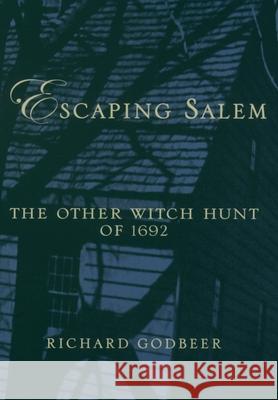Escaping Salem: The Other Witch Hunt of 1692 » książka
Escaping Salem: The Other Witch Hunt of 1692
ISBN-13: 9780195161304 / Angielski / Miękka / 2005 / 200 str.
The Salem witch hunt of 1692 is among the most infamous events in early American history; however, it was not the only such episode to occur in New England that year. Escaping Salem reconstructs the "other witch hunt" of 1692 that took place in Stamford, Connecticut. Concise and accessible, the book takes students on a revealing journey into the mental world of early America, shattering the stereotype of early New Englanders as quick to accuse and condemn.
Drawing on eyewitness testimony, Richard Godbeer tells the story of Kate Branch, a seventeen-year-old afflicted by strange visions and given to blood-chilling wails of pain and fright. Branch accused several women of bewitching her, two of whom were put on trial for witchcraft. Escaping Salem takes us inside the Connecticut courtroom and into the minds of the surprisingly skeptical Stamford townspeople. Were the pain and screaming due to natural or supernatural causes? Was Branch simply faking the symptoms? And if she was indeed bewitched, why believe her specific accusations, since her information came from demons who might well be lying? For the judges, Godbeer shows, the trial was a legal thicket. All agreed that witches posed a real and serious threat, but proving witchcraft (an invisible crime) in court was another matter. The court in Salem had become mired in controversy over its use of dubious evidence. In an intriguing chapter, Godbeer examines Magistrate Jonathan Selleck's notes on how to determine the guilt of someone accused of witchcraft, providing an illuminating look at what constituted proof of witchcraft at the time. The stakes were high--if found guilty, the two accused women would be hanged.
In the afterword, Godbeer explains how he used the trial evidence to build his narrative, offering an inside perspective on the historian's craft. Featuring maps, photos, and a selected bibliography, Escaping Salem is ideal for use in undergraduate U.S. survey courses. It can also be used for courses in colonial American history, culture, and religion; witchcraft in the early modern world; and crime and society in early America.











